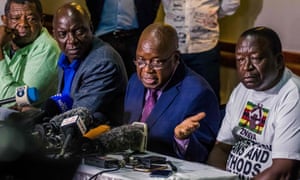
Zimbabwe’s powerful war veterans have claimed that Robert Mugabe swapped speeches to avoid resigning during a televised address to the nation on Sunday night, as they repeated their call for him to go.
The 93-year-old, sacked as leader of the ruling Zanu-PF party, had been given a noon deadline (1000 GMT) on Monday to resign as head of state or face impeachment when parliament reconvenes on Tuesday.
A draft impeachment motion published by Zanu-PF after the deadline passed said Mugabe was a “source of instability” who had shown disrespect for the rule of law and is to blame for an unprecedented economic tailspin over the past 15 years.
His rambling address on Sunday offered no substantial concessions to his critics, the tens of thousands who have marched calling for his resignation, or the army commanders who led the military takeover last week.
Instead the veteran autocrat called for compatriots to avoid “bitterness or revengefulness which would not makes us any better … Zimbabweans” and said that he would preside over a special congress of the ruling Zanu-PF party scheduled for next month.
An array of senior commanders sat beside Mugabe as he made his speech. Constantino Chiwenga, the general who led the takeover, turned the president’s pages as he spoke.
“We were disappointed yesterday in the midst of all those generals he appeared to swap [speeches],” Chris Mutsvangwa, who leads the war veterans, told a press conference on Monday morning.
Mutsvangwa said the veterans would call for further protests – including a sit-in outside Mugabe’s Harare residence where he is being held under house arrest – if the president did not heed calls to quit.
Amid the continuing confusion, CNN reported on Monday that Mugabe has agreed to stand down and has drafted a resignation letter, citing a source familiar with his negotiations with the military.Under the terms of the deal, Mugabe and his wife, Grace, would be granted full immunity, CNN said. A government official with knowledge of the talks said he did not know of a resignation letter but that negotiations were continuing.
“Mugabe has said all sorts of things … and is making promises one hour which are gone the next. He is not in full understanding of what is happening,” the official said.
Two senior political sources told Reuters Mugabe agreed to resign on Sunday but Zanu-PF did not want him to quit in front of the military, an act that would have made its intervention look like a coup. “It would have looked extremely bad if he had resigned in front of those generals. It would have created a huge amount of mess,” one senior party source said.
Another political source said the speech was meant to “sanitise” the military’s action.
Mugabe, who repeatedly cited the legacy of Zimbabwe’s brutal liberation wars of the 1960s and 1970s in his speech, said he believed that the military “operation” launched last Tuesday by army commanders was motivated by “a deep patriotic concern for the stability of the nation” and “did not amount to a threat to our well-cherished constitutional order”.
It is unclear how long the procedure to remove the president might take but could possibly be done within hours if there is no opposition, as seems likely.
Mugabe, who as president is also commander-in-chief of the armed forces, would then be reduced to the status of any other citizen.
More protests are planned to maintain the pressure on the ageing ruler.
Emmerson Mnangagwa, 75, the vice-president whose sacking 13 days ago led to the military takeover, was appointed interim leader of Zanu-PF on Sunday and is widely expected to take over from Mugabe as president.The moves by Zanu-PF followed huge demonstrations in cities across the country on Saturday demanding Mugabe leave power.
The military has said it has no intention of taking permanent control of government but has indicated it does not want to leave Mugabe in office.
The military commanders claim last week’s takeover was necessary to remove “criminals” close t
The purge has in effect decimated the group and underlines the degree to which the overthrow of Mugabe’s 37-year rule has been driven more by competition for power within the Zanu-PF than popular anger at a dictatorial and corrupt regime.
Grace Mugabe, 52, has not been seen since the takeover. Sources told the Guardian she was in her husband’s Harare residence when he was detained on Tuesday and had not moved since.Since taking power, the military has arrested about a dozen senior officials and ministers. Several remain detained. Two senior politicians close to the first lady are believed to have taken refuge with their families in the president’s residence on the night of the military takeover.
Few options are now open to Mugabe, who ruled Zimbabwe through a mixture of coercion, bribery and revolutionary rhetoric, beyond playing for time. Support in some branches of the security establishment – such as the police – has evaporated.
Army commanders have long had good relations with Mnangagwa, a former intelligence chief and veteran Zanu-PF official who was responsible for the repression of opposition parties in successive elections between 2000 and 2008.
Opposition leaders in Zimbabwe have called for the formation of an inclusive transitional government but risk being sidelined by the powerful army and the ruling party.
Rory Stewart, the UK’s Africa minister, said the entire international community would provide aid to Zimbabwe if he was deposed and the country held free and fair elections next year.
“I think he [Mnangagwa] will be reaching out to Britain and to others because he wants legitimacy and international support to get the Zimbabwean economy off the ground,” Stewart added.
A spokesman for Theresa May said “what does appear clear is that Mugabe has lost the support of the people and of his party”.
source:-theguardian.

